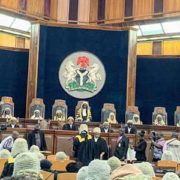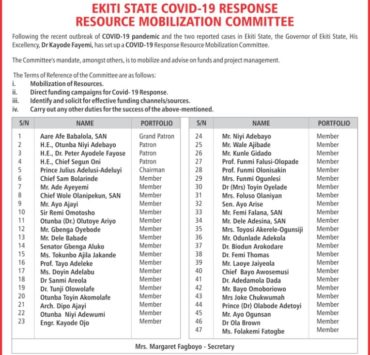A DETHRONED KING: LEGAL OR NOT?
Lawyard is a legal media and services platform that provides…
The Emir of Kano, Alhaji Muhammad Sanusi II was recently dethroned by the Kano State Government and this raised some legal and constitutional issues. The Emir was dethroned yesterday, 9th March 2020 and banished to Nasarawa state, where he will be exiled at the pleasure of the Kano State Government. The Emir arrived at his new residence last night and was immediately replaced by Aminu Ado Bayero, the Emir of Bichi, whose appointment may not be unconnected with suppressing a potential rising revolt by the commoners against what has been perceived as the harassment of their royal institution. Armed security barricaded the palace and prevented entry and exit. Reports also showed that the Emir was placed under house arrest and the palace was sealed off by security agents.
It is said that history may just be repeating itself as his grandfather, Muhammad Sanusi I was dethroned in 1963 by the then Governor of the Northern Region, Sir Kashim Ibrahim and banished to Azare in Bauchi. Legal Analysts have pondered on the legality or otherwise of the dethronement some of which have been identified as bordering on his right to fair hearing and personal liberty.
The Governor of Kano State, Dr Abdullahi Ganduje defended the decision of the in dethroning the Emir, citing disrespect to constituted authorities and persistent refusal to attend official meetings and programmes organized by the government without lawful justification as provided for by Section 13(a-e) of the Kano State Emirate Law 2019. His removal is said to have been made after, “due consultations with the relevant stakeholders and in compliance with part 3 of the Kano State Emirate Law 2019”. It was further stated that the removal was, “reached in order to safeguard the sanctity, culture, tradition, religion and prestige of the Kano Emirate built over a thousand years.” The new Emir was appointed and announced pursuant to Section 11(1) of the Kano State Emirate Law 2019 at an emergency State Executive Council meeting presided by the Governor.
In December the Kano State Governor, Abdullahi Ganduje at a special ceremony, signed into law the 2019 Kano Emirate Council Bill he sent to the state House of Assembly for the creation of four new emirates in the state, the same day it was unanimously passed and approved by the state lawmakers. The fresh bill was approved by the state executive council and presented to the lawmakers following the nullification of Kano Emirs Appointment and Depositions Amendment Laws 2019 by Justice Usman Na’Allah of the State High court.
Some legal experts have opined that the process of dethronement of the Emir and his banishment may be overturned on grounds that it runs contrary to the principle of fair hearing and personal liberty guaranteed under the Sections 35 and 36 of the Nigerian Constitution. There is also the issue of challenging the legality or otherwise of the Kano State Emirate Law 2019 – the law under which he was removed. Is said that the embattled Emir was already in court, challenging the legality of the law and the state governor should have waited for the outcome of the court before proceeding to dethrone the Emir.
Also, up for debate, is whether or not due process for removal of an Emir was complied with by the Kano State Government. Again, it is unclear whether the Kano state government has the power to take away the deposed emir’s freedom as his dethronement was done administratively and not via an order of court. The Nigerian Constitution provides that a person accused of wrongdoing must be afforded a fair hearing in a court of law. This matter should have been left for the courts to determine and not for the executive arm to adjudge him guilty.
Lawyard is a legal media and services platform that provides enlightenment and access to legal services to members of the public (individuals and businesses) while also availing lawyers of needed information on new trends and resources in various areas of practice.












